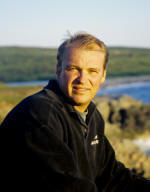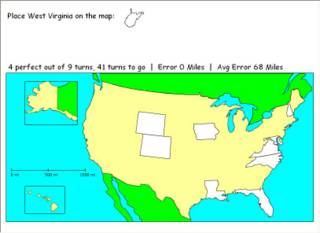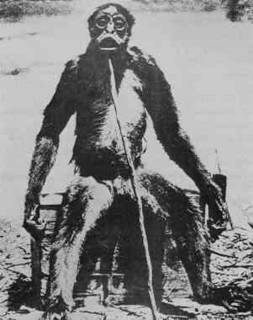 Shanghai Financial CentreWhile not exactly related to the art, craft, and travails of travel writing, I enjoyed the list and will post it here in it's entirety, before it disappears into the blogosphere, never to be seen again. I've done some editing to clean up the text and get rid of all those obnoxious pop-up ads for Las Vegas and such. Las Vegas pop-ups at Outside? Somehow, that just doesn't seem right.
Shanghai Financial CentreWhile not exactly related to the art, craft, and travails of travel writing, I enjoyed the list and will post it here in it's entirety, before it disappears into the blogosphere, never to be seen again. I've done some editing to clean up the text and get rid of all those obnoxious pop-up ads for Las Vegas and such. Las Vegas pop-ups at Outside? Somehow, that just doesn't seem right.
There are a couple of good reasons to visit the Outside website. First, they have pretty pictures of all the book covers. Second, they have Amazon links to most titles, so you can order them for your personal library.Outside Magazine and their 25 Book Recommendations for Explorers too Damn Lazy to Actually Explore, but Like to Read about the StuffThe Outside Adventure Canon
The 25 (Essential) Books for the Well-Read Explorer
By Brad Wieners & The EditorsHey, we're with you. Given half a chance, we'd much rather hit the road than the armchair. Nothing can replace the intensity of authentic experience. Yet experience needs shape and wisdom— and behind every great adventure are the stories that inspired it. We read before we go; and after we arrive, free and clear in far-flung terrain and edgy places, we invariably find echoes of the voices that led us there.
The following list is devoted to books that offer the truest inspiration, the deepest reflection, the strongest provocation. These are books that seize imaginations and rattle sedentary lives. Longtime readers will note that this is our second venture in literary list-making. The first Outside Canon, which appeared in May 1996, spanned many centuries, from Gilgamesh to Al Gore, and encompassed a host of genres, including fiction, sports, environmental manifestos, natural history, poetry, and how-to books.
This time around, we were determined to drill to the core. To compile the distilled contents of a tool kit for adventure literacy. The writing, we decided, must be urgent and contemporary in spirit, so we narrowed our sights to the last 100 years or so. No fiction. No collections and no geopolitical reportage. (Otherwise, how could we pass up Cahill and Kapuscinski?) Nothing classic for the sake of self-importance—we wanted two-fisted, readable works defined by an insatiable appetite for the world at its wildest. Books that do what the indomitable boxer Joe Frazier had in mind when he said, "I don't want to knock my opponent out. I want to hit him, step away, and watch him hurt. I want his heart."
25. OLD GLORY
Jonathan Raban
(1981)THERE ARE GRANDER adventures than Raban's on this list, but few as eloquent. "I found that I had landed up in a tree slum," Raban writes during his journey in a 16-foot aluminum boat down the Mississippi, "where overcrowding and miscegenation had made it almost impossible to make out the individuals in the tangled mass....They didn't seem to be aware of the opportunities for trees in North America." Though Raban's wit is always intact, we do sometimes question his fortitude. (What's up with his mortal fear of birds?) But we're suckers for his Brit's-eye view of America—and for his Huck's-eye view of the Big Muddy: "I drifted downstream, just letting the river unroll around me....The charts and tree book seemed hopelessly thin and theoretical when set against the here-and-now of the Mississippi itself. The river was simply too big, too promiscuous...it would never tamely submit to posing for its portrait."
24. A WALK IN THE WOODS
Bill Bryson
(1998)HANDS DOWN, far and away the funniest book you'll ever read on long-distance through-hiking. In his lazy, TV-addled pal Stephen Katz, Bryson couldn't have picked a less prepared partner for an attempt on the Appalachian Trail—nor a better comic foil. "For two days, Katz barely spoke to me. On the second night, at nine o'clock, an unlikely noise came from his tent—the punctured-air click of a beverage can being opened—and he said in a pugnacious tone, ÔDo you know what that was, Bryson? Cream soda. You know what else? I'm drinking it right now. And I'm not giving you any. And you know what else? It's delicious.'"
23. ALIVE
Piers Paul Read
(1974)
THE PERFECT STORM
Sebastian Junger
(1997) YEAH, SO WE CHEATED. Try as we might, we couldn't break the tie between these two blockbusters of disaster. Fact is, they've both outlasted their initial sensational appeal— and one reason, we suspect, is that they're stories of people confronted with great danger they did not seek. British author Read's subjects—members of a Uruguayan rugby team whose Fairchild F-227 crashed in the Andes in October 1972—had no intention of conducting a ten-week, cannibalistic survival course above timberline. Especially grisly—aside from, yes, the consumption of "raw meat"—is the avalanche that buried the survivors on their 17th day stranded: Read gives a paragraph or more to each man, and you may have to remind yourself to inhale: "Pedro Algorta, still buried beneath the snow, had only what air he held in his lungs. He felt himself near to death, yet the knowledge that after his death his body would help the others to survive instilled in him a kind of ecstasy. It was as if he were already at the portals of heaven."
Junger's Massachusetts fishermen were out trying to make a living when a "once in a century" nor'easter hit in October 1991, and their hard luck deepens this account of their loss. Perilous work is Junger's grand theme, and his abiding respect for it enables him to go beyond the events at hand, whether deciphering complicated meteorology or reporting the angry sorrow of wives and brothers seeking justice that isn't coming. In the paperback, eager to get it right, Junger cleared up controversies surrounding his facts, but he'd already taken what could have been a maudlin story and banged it into a thriller.
22. MY JOURNEY TO LHASA
Alexandra David-Neel
(1927)FRANKLY, SHE'S NOT in the demographic. She's 54. She's stout. She's a former opera singer, for crying out loud. Who cares? A scholar of Eastern religion and Tibetan language, David-Neel was indisputably a fearless traveler, a rogue's rogue who, in 1923, disguised as an illiterate pilgrim, became the first Western woman to reach Tibet's forbidden city.
Mind you, My Journey to Lhasa doesn't reinvent the form. David-Neel sets down what happened in the order it happened, and her attention to detail is almost anal. She even has the requisite adventure sidekick, a young Sikkimese monk. An unlikely pair, they're stuck together in an escapade that involves everything from fooling the locals with their disguises to crossing 19,000-foot passes at night. "Was the lama far behind?" she writes. "I turned to look at him. Far, far below, amidst the white silent immensity, a small black spot, like a tiny Lilliputian insect, seemed to be crawling slowly up....An inexpressible feeling of compassion moved me to the bottom of my heart....I would find the pass; it was my duty."
David-Neel's prose is of its time, in the best and worst ways, but her account has the power to awe even today.
21. KON-TIKI
Thor Heyerdahl
(1950)"JUST OCCASIONALLY you find yourself in an odd situation. You get into it by degrees and in the most natural way but, when you are right in the midst of it, you are suddenly astonished and ask yourself how in the world it all came about."
So begins Heyerdahl's Kon-Tiki, the very prototype of the seemed-like-a-good-idea-at-the-time fool's errand. Heyerdahl, of course, set out on a balsa raft in 1947 to prove that the South Pacific could have been peopled by natives of Peru. Along with five equally loco Norwegians and a parrot, he survives on fish that literally hurl themselves on deck, meets up with a few sharks, and endures a beaching in Tahiti. Though the trip proved inconclusive (to say the least), it created such a sensation that lecture halls around the world sold out for debates on Polynesian history. Heyerdahl's antics can have a hand-me-down quality, something vaguely remembered from seventh-grade social studies, but just because everyone's supposed to read him doesn't mean he's not great company. Heyerdahl's happily aware that his is an absurd cosmic prank, but it's still one heck of a story of men and the sea.
20. GREAT PLAINS
Ian Frazier
(1989)TALK ABOUT A ROAD TRIP: Frazier begins this gem with an ode reminiscent of Whitman—"Away to the great plains of America, to that immense western short-grass now mostly plowed under!"—and ends with 65 wonderful pages of notes on everything from Dodge City's other nicknames ("Bibulous Babylon of the Frontier") to how Native Americans used their bodies as alarm clocks by drinking lots of water before going to bed. In between, he cruises from the Black Hills to Turkey, Texas, holding forth with visionary zeal: "Personally, I love Crazy Horse," he writes, "because, like the rings of Saturn, the carbon atom, and the underwater reef, he belonged to a category of phenomena which our technology had not then advanced far enough to photograph." Sure, we fought over whether Frazier packed enough red-blooded adventure into this book to make the cut. He gets around mostly by car, so we might just as easily have tapped Steinbeck's Travels with Charley, or Least Heat-Moon's Blue Highways, or gone straight for the source of our adolescent wanderlust with On the Road. Well, we could have, and we didn't—not because we don't love those other asphalt serenades, but because Great Plains both delivers a song of the open road and defibrillates the heartland like no book we know.
19. YOUNG MEN AND FIRE
Norman Maclean
(1992) MACLEAN MAY BE be best known for the novella and short stories collected in A River Runs Through It, but the nonfiction Young Men and Fire, an unfinished work written in his "antishuffleboard" years and published two years after his death, has every bit the passionate following River did before Redford brought it to the screen. In many ways, this is the original smoke- jumper story, reopening the file on one of the worst firefighting disasters in history, the Mann Gulch Fire of 1949. Some of the earliest jumpers chuted in and set to work on the massive Montana blaze not far from Maclean's cabin; two hours later, 12 of the 15 had been burned "like squirrels." By turns intensely beautiful—rarely is something so dangerous rendered so lyrically—and exquisitely erudite on the physics of fire, Maclean's affecting book is full of taut passages that jack your pulse rate as the men try to outpace the runaway blaze. "The grass and brush of Mann Gulch could not be faster than it was now," Maclean writes, as the smoke jumpers realize they are hemmed in by a ridge. "It could run so fast you couldn't escape it and it could be so hot it could burn out your lungs before it caught you."
18. RUNNING THE AMAZON
Joe Kane
(1989)AS RUNNING THE AMAZON opens, our man Kane is something of an Outside Everyman. He's been editing a newsletter for the Rainforest Action Network; he arrives in the Andes toting a copy of The Portable Conrad; he's joking about being shot at by the Shining Path. (Soon enough this won't be a joke.) He's also the only American among nine men and one woman attempting the first descent of the Amazon. Not a splashy writer so much as a sharp one, Kane starts slowly but soon has you gulping down chapters the way the team knocks back pisco: "At the beginning at least, whitewater adrenaline comes cheap. It's the river doing the work, of course, but like a teenager with a hot car, one forgets what the true power source is. Arrogance reigns....You think: Let's get on with it." And Kane does, observing how arrogance gets chastened to humility, and noting each snag of dysfunction in a team of which only four go the distance. It's that combination of interpersonal struggle and poignant scenes of life on the river that elevates Running the Amazon above the deluge of first-descent books. That and the fact that he had 4,200 miles of material to work with.
17. THE LONG WAY
Bernard Moitessier
(1971)"WHEN YOU HAVE long skirted vast expanses stretching to the stars, beyond the stars, you come back with different eyes." So writes Moitessier, contemplating his return to dry land after ten months on the open ocean. We love this book because of its sheer boldness: At the head of the pack in the 1968 Golden Globe, the first round-the-world solo yacht race, the author passes up the chance to claim victory and just keeps going. Moitessier ultimately puts ashore in Tahiti, having slingshotted a farewell note aboard a passing ship and jettisoned his clothes and many cases of good red wine along the way. At sea the Frenchman is a holy fool, disillusioned by society and reluctant to let go of the ineffable feeling of well-being he gains at sea. There are any number of supposedly more gripping, can't-put-it-down seafaring stories (see the sad tale of his fellow racer Donald Crowhurst on page 65), but we challenge you to find one more appealing than Moitessier's thoughtful and high-spirited log. And that goes for the man who inspired him, Joshua Slocum, number seven on this list. It's no coincidence that Moitessier named his 40-foot steel ketch Joshua.
16. TRACKS
Robyn Davidson
(1980)YOU READ Robyn Davidson and think: I've had friends like you. Friends around whom fun tends to metastasize. Friends you facetiously hate, because they blow into town and stage weekends it takes weeks to recover from. No question, she's plumb crazy—"gone tropical" as she puts it—but crazy in the best sense of the word. At 27, the young Australian arrived in Alice Springs with six dollars, trained two wild camels (you try it), and set off for the Indian Ocean with the semiferal dromedaries, two tame ones, and her dog. But behind the madcap drama of the "camel lady," as Davidson became known, are a young woman's complicated emotions about the end of adventure and the arrival of fame. Reaching the ocean after 1,700 miles, she "rode down that stunningly, gloriously fantastic pleistocene coastline with the fat sun bulging on to a flat horizon and all I could muster was a sense of it all having finished too abruptly, so that I couldn't get tabs on the fact that it was over." Just weeks later she'd be feted in New York, realizing that she "was forgetting that what's true in one place is not necessarily true in another. If you walk down Fifth Avenue smelling of camel shit and talking to yourself you get avoided like the plague." Davidson is the world's most reluctant darling—but walking wild, ragged, and alone, she blew the dust off the tired, musty feet of white-male adventure.
15. A SHORT WALK IN THE HINDU KUSH
Eric Newby
(1958)"NEWBY TO FRIEND: I'm bored. Let's drive to Afghanistan and climb some previously unvisited peaks in the Hindu Kush. "Friend to Newby: Good idea, but we don't know how to climb mountains. "Newby to Friend: Not a problem. We'll go to Wales for the weekend and learn how."
That's how Tony Wheeler, the founder of Lonely Planet and the proud U.S. publisher of A Short Walk, summarizes this droll classic, the original buddy flick of Extreme Lit. Without Newby, there might never have been a Bryson, an O'Hanlon, or a Cahill. He's the backpacker without a cause, the sort who gives himself over to the journey—a quite ambitious trek through Afghanistan's rugged Nuristan region—certain that only by blundering forward can the purpose of the excursion be revealed. Newby reminds us that even a valid passport is inessential to traveling. All you really need is to be game.
14. ARCTIC DREAMS
Barry Lopez
(1986)THANKS TO FELLOW badass Edward Hoagland's glowing New York Times review, critics couldn't seem to refer to Arctic Dreams without the word "jubilant," which, from a certain perspective, is curious. After all, close encounters with polar bears, killer whales, and walruses, while thrilling, aren't necessarily joyful, and tend to make the author, by his own confession, rather anxious.
"It is not all benign and ethereal at the ice edge," Lopez writes. "You cannot—I cannot—lose completely the sense of how far from land this is. I am wary of walrus....A friend of mine was once standing with an Eskimo friend at an ice edge when the man cautioned him to step back. They retreated 15 to 20 feet. Less than a minute later, the walrus surfaced in an explosion of water where they had been standing."
Lopez may feel inexperienced, but it's hard to imagine a better interpreter of the far north. His descriptions of the Arctic Ocean shine: "A geometry of lightning-bolt-shaped leads, of long black ponds, jagged rills, and ridges of debris that meander like eskers stretches as far as light and the atmosphere let you see." And come to think of it, though Arctic Dreams involves a great deal of solitude and icebergs and cold, jubilant is the word. Lopez leaves us amazed by the natural world, respectful of our place in it, and elated at its dazzling variety.
13. IN PATAGONIA
Bruce Chatwin
(1977)
WE KNOW WHAT you're thinking: Idiots, it's fiction! But the claims that Chatwin lied to fashion the episodes and characters that make up this exquisite little book turn out to be greater exaggerations than Chatwin's own. Sure, he got things out of order, mangled some Spanish, and dished up a few now-classic Chatwinian embellishments (Se-ora Eberhard's run-of-the-mill steel chair becoming a Mies van der Rohe, for one). But In Patagonia is at heart a personal quest—to find the origins of boyhood fascination, "a piece of brontosaurus" supposedly recovered from a thawed glacier in Punta Arenas by Chatwin's seafaring cousin. At first Chatwin's prose seems uniform—like Hemingway, only boring. But his subtle sentences sneak up on you, and their economy allows him to surprise, leaving an indelible impression. Take Walter Rauff, exiled Nazi and inventor of the lethal Mobile Gas Truck: "There is a man in Punta Arenas, dreams pine forests, hums Lieder, wakes each morning and sees the black strait. He drives to a factory that smells of sea. All about him are scarlet crabs, crawling, then steaming. He hears the shells crack and the claws breaking, sees the sweet white flesh packed firm in metal cans....Does he remember that other smell, of burning?" Chatwin's haunting images stay with you, reminding you that this is one messed-up, astonishing world.
12. THE MOUNTAINS OF MY LIFE
Walter Bonatti
(2001)BONATTI'S MEMOIRS—finally published in the United States just two years ago—take pride of place here over a number of towering works on mountaineering because (a) Bonatti was a god, a poetic soloist whose career included a controversial role in the first ascent of K2, and (b) he proves he can write as gracefully about a sunrise over the Alps as about an epic first ascent: "The horizon showed up sharply, enchanted peaks plucked clean by the claws of a freezing and frenzied wind," Bonatti says of his 1962 ascent of the Alps' Pilier d'Angle. "When I looked out I saw the most beautiful spectacle one can encounter at dawn on the peak of Mont Blanc: on the one hand the Italian flank flooded with warm and blazing light, on the other the Savoie still immersed in night."
Take nothing away from Gaston Rebuffat's 1954 Starlight and Storm, the Frenchman's spare and lovely tract that made the case for climbing as a communion with, rather than siege upon, mountains. And we know as well as anyone that Maurice Herzog's canonical 1953 Annapurna was the Into Thin Air of its day, inspiring Ed Viesturs and countless other next-generation alpinists to take up climbing. But in returning to Annapurna we found we'd rather skip Herzog's press-release nationalism and hang out with Bonatti.
11. TOUCHING THE VOID
Joe Simpson
(1988)AS MOUNTAINEERING survival stories go, this is the destroyer of its class: an incredible climbing epic in the hands of a pitch-perfect writer. The book starts out as a journal about the solace (and menace) of going high and remote (Peru's 21,000-foot Siula Grande) but soon becomes something else entirely. On the descent from the 21,000-foot summit, the author, suffering from a broken leg and damaged ribs from a previous accident, falls into a crevasse. His partner, Simon Yates, presuming him a goner and unable to keep Simpson's dead weight from pulling him off the mountain, does the unthinkable: He cuts the rope. Alone in a canyon of ice, Simpson veers from stubborn determination to screaming anger and despair: "There was no one to hear," he writes, "but the looming empty chamber behind me made me feel inhibited, as if it were some disapproving silent witness to my weakness."
The book's device of interspersing the devastated Yates's thoughts in italics makes for amazing reading, and the pair's reconciliation three days later at base camp, after Simpson has dragged himself down the scree, is a scene—and theme—that rises far above the mountaineering genre. Present the ethics of this book to someone who's never climbed a mountain and you could still end up talking about it all night.
10. ARABIAN SANDS
Wilfred Thesiger
(1959)THE LAST GREAT British explorer? Eric Newby, for one, might jokingly beg to differ, but that's because Thesiger called him a pansy when they met in the Hindu Kush. Sir Wilfred, the now-92-year-old troubadour who explored Arabia's Empty Quarter before the oil fields tamed Bedouin culture, valiantly resists the lame camel jokes made by so many of his contemporary countrymen and, in contrast to many of today's travel diarists, rarely makes himself the subject of his own stories. Thesiger's love of the desert is never easy, always hard-won. "I climbed a slope above our camp and bin Kabina joined me. I was hungry; I had only half my portion of the ash-encrusted bread the night before. The brackish water which I had drunk at sunset had done little to lessen my nagging thirst. Yet the sky seemed bluer than it had been for days. The sand was a glowing carpet set about my feet." For us, the question was merely, Which Thesiger? Yes, Marsh Arabs may be, as some critics claim, the better book, but Arabian Sands is electric. And sure, we love those pithy quotes from T. E. Lawrence's The Seven Pillars of Wisdom, but we're in no mood for that bombast cover to cover. Stick with Thesiger: He'll make you wish you were born 50 years earlier and could make the trips he did—with him.
9. COMING INTO THE COUNTRY
John McPhee
(1976)LIKE THESIGER, there's no question that McPhee belongs on this list—the struggle comes in choosing which book. We were charmed by the slightly obscure Survival of the Bark Canoe. And certainly we heard from those who agitated for Encounters with the Archdruid, about environmental guru David Brower. But in the end our vote went to Coming into the Country. Drawing on a marathon canoe trip down Alaska's Salmon River and a season in a cabin on the Yukon River, McPhee knits together a passion for the backcountry, an unsentimental yet stirring view of Alaska's native tribes, and a hard look at the many misguided attempts to manage the Last Frontier's natural resources (with a brilliant recap of the pipeline saga). McPhee pretty much tackles all the big questions here: "To a palate without bias—the palate of an open-minded Berber, the palate of a travelling Martian—which would be the more acceptable, a pink-icinged Pop-Tart with raspberry filling (cold) or the fat gob from behind a caribou's eye?"
Really, no one has done a better job of combining ride-along backcountry hijinks and lucid parsing of enviro policy than McPhee does here. Four hundred thirty-eight pages, and nothing less than the fate of Western civ, on a canoe trip.
8. INTO THE WILD
Jon Krakauer
(1996)IS INTO THIN AIR the more influential book? Absolutely. Is it the more thrilling? Arguably. However, not only is Into the Wild more arrestingly written and reported than its more famous cousin, it also stands up better to rereading. And whereas Into Thin Air delivers a stinging indictment of what's wrong with modern mountaineering—including ill-prepared individuals trying to "buy" the world's summits—Into the Wild, which follows the final days and nights of a young idealist named Chris McCandless, speaks to anyone who has ever yearned for something pure, to be free of the affluenza of American life, to be self-reliant.
Like Into Thin Air, Into the Wild began as an article in Outside. But the book combined that investigation with material from new sources, people McCandless had met en route to Alaska who were brought out of the woodwork by the article. One of those whom McCandless touched most profoundly was Ronald Franz (not his real name), an 80-year-old so taken with the young man that he waited at McCandless's campsite in the desert near the Salton Sea for his return.
From the accounts of people like Franz to close readings of McCandless's underlined copies of Doctor Zhivago and Walden ("No man ever followed his genius till it misled him"), Krakauer not only gets why McCandless retreated to the bush, but makes use of his own backcountry experience to empathize with him. Some readers have suggested that Krakauer is too easy on the kid and that McCandless ought to be viewed as suicidal, manipulative, or ridiculous, but Krakauer keeps it all an open question. Into the Wild reminds us that the very qualities of being in the wilderness that thrill and restore us—or lead us, as Roderick Nash wrote, to "either melancholy or exultation"—can swiftly take our lives.
7. SAILING ALONE AROUND THE WORLD
Captain Joshua Slocum
(1900)A CENTURY LATER, Slocum's account of the first-ever solo circumnavigation of the earth, and then some, on his 37-foot sloop, Spray, remains the title by which all other sailing books are judged—not only because of its derring-do, but because it's completely winning. "The day was perfect, the sunlight clear and strong," Slocum writes. "Every particle of water thrown into the air became a gem, and the Spray, making good her name as she dashed ahead, snatched necklace after necklace from the sea, and as often threw them away." Few contemporary sailing accounts come close to matching Slocum's logs, not least for the captain's sly wit: "Some hailed me to know where away and why alone. Why? ...The shore was dangerous!" This coming from a man who'd previously suppressed a mutiny and survived an ocean storm in a canoe. Sailing Alone Around the World only improves with age, because reading it is like being present at the creation of the modern explorer-adventurer. Thoreau may have convinced us to return to the wild; Slocum revealed how that journey could be a feat of endurance, and a lighthearted spectacle to boot. If only the multitudes who followed his example did so on the page. Slocum never sells you on his story; he just tells it.
6. ENDURANCE
F.A. Worsley
(1931)FIRST OFF, he was there. Sure, Alfred Lansing's 1959 Endurance has stood the test of time as a journalist's chronicle, and Caroline Alexander broke new ground four years ago with her own Endurance's comprehensive retelling of Sir Ernest Shackleton's epic survival story. But as captain of the real HMS Endurance and navigator of the lifeboats he and Shackleton used to effect a rescue across the Southern Ocean, Frank Worsley proved himself not only one of the finest small-craft sailors of the 20th century, but also a less official, more anecdotal, and, ultimately, more electrifying diarist than Sir Ernest himself.
By now, most people know this story down to the last dog and cat, but the immediacy of Worsley's account revitalizes it. If you don't feel his sorrow in losing his ship to the ice pack, share his delirium glissading down to the South Georgia whaling station that would be their salvation (a scene to which Shackleton, ever careful not to seem whimsical, gives only a cursory line in South), or tear up when the two men return to their friends on Elephant Island 128 days after they set out, you don't love adventure.
5. DESERT SOLITAIRE
Edward Abbey
(1968)
OBVIOUSLY.
Three decades and change later, Cactus Ed is still Iggy Pop in a stale world of environmental classic rock. So punk that it transcends the natural history genre, Abbey's account of two seasons spent as a ranger in Arches National Park is about soul-searching, but without an ounce of New Age squish. "I dream of a hard and brutal mysticism in which the naked self merges with a non-human world and yet somehow survives still intact, individual, separate. Paradox and bedrock." Argue with that.
4. THE SNOW LEOPARD
Peter Matthiessen
(1978)SIMPLY PUT, The Snow Leopard gets to the heart of why we go to the mountains. There are many other fine books on the subject—John Muir's My First Summer in the Sierra comes to mind—but none succeed, as Matthiessen's does, on so many levels.
One could say, for example, that it's a book about sheep. After all, it delivers a funny, anecdotal account of American zoologist George Schaller's field research on the Himalayan blue sheep, or bharal. ("Oh, there's a penis-lick!" G.S. cries out, observing the rut. "A beauty.") Then there's the mythic cat of the title, which had been glimpsed by only two Westerners when Matthiessen and Schaller set out to track it in 1973. And the place—the mysterious Land of Dolpo, a last enclave of Tibetan culture. And finally, without ever becoming a book about recovery, The Snow Leopard charts how the author came back to life after a great loss—his wife, Deborah, had died of cancer the year before he left for the Himalayas. "Why is death so much on my mind when I do not feel I am afraid of it?" Matthiessen asks, while walking a sheer Himalayan ridge. "Between clinging and letting go, I feel a terrific struggle. This is a fine chance to let go, to 'win my life by losing it.'"
3. WEST WITH THE NIGHT
Beryl Markham
(1942)SURE, MARKHAM STARTS a touch self-consciously, wondering aloud where, in the blur of her career as a pilot in Kenya during the 1930s, she ought to begin this tour de force memoir. But if you haven't forgiven her this slightly contrived opening in three or four pages, we'd be surprised. The essence of a fascinating party guest, Markham is not only charming, but full of real adventures to tell—from being mauled by a lion at age seven and nearly trampled by an elephant as an adult to bringing game hunters into (and, happily, back out of) the wild. Equally adept at telling a nail-biter as she is at waxing poetic about an African horizon or making you sorry her dog got gored by a warthog, you discover early and often why Hemingway gushed that she made him feel inadequate as a writer. "The only disadvantage in surviving a dangerous encounter," she observes, "lies in the fact that your story of it tends to be anticlimactic. You can never carry on right through the point where whatever it is that threatens your life actually takes it—and get anybody to believe you. The world is full of skeptics." Markham is one of the few authors you are nearly always grateful to have as the hero of her own stories. Read her as soon as you can, but be prepared to fall in love with a ghost.
2. THE WORST JOURNEY IN THE WORLD
Apsley Cherry-Garrard
(1922)SO MANY SUPERLATIVES have been heaped on this sick pup that it's hard not to feel a little jaded before you read it. "The Worst Journey in the World—it's the book that has had the biggest impact on my life."—Sir Edmund Hillary, Adventurer
Don't let the hype—or, for that matter, the dozens of other books on Robert Falcon Scott's doomed 1911 South Pole expedition—scare you off. Livelier than Scott's own writings (collected in Scott's Last Expedition) and more immediate than Roland Huntford's modern classic The Last Place on Earth, Cherry-Garrard's first-person account of this infamous sufferfest is a chilling testimonial to what happens when things really go south. Many have proven better at negotiating such epic treks than Scott, Cherry, and his crew, but none have written about it more honestly and compassionately than Cherry. "The horrors of that return journey are blurred to my memory and I know they were blurred to my body at the time. I think this applies to all of us, for we were much weakened and callous. The day we got down to the penguins I had not cared whether I fell into a crevasse or not."
1. WIND, SAND AND STARS
Antoine de Saint-Exupéry
(1939)LIKE HIS MOST FAMOUS creation, The Little Prince, that visitor from Asteroid B-612 who once saw 44 sunsets in a single day, Saint-Exupéry disappeared into the sky. Killed in World War II at age 44, "Saint Ex" was a pioneering pilot for Aéropostale in the 1920s, carrying mail over the deadly Sahara on the Toulouse-Dakar route, encountering cyclones, marauding Moors, and lonely nights: "So in the heart of the desert, on the naked rind of the planet, in an isolation like that of the beginnings of the world, we built a village of men. Sitting in the flickering light of the candles on this kerchief of sand, on this village square, we waited out the night." Whatever his skills as a pilot—said to be extraordinary—as a writer he is effortlessly sublime. Wind, Sand and Stars is so humane, so poetic, you underline sentences: "It is another of the miraculous things about mankind that there is no pain nor passion that does not radiate to the ends of the earth. Let a man in a garret but burn with enough intensity and he will set fire to the world." Saint-Exupéry did just that. No writer before or since has distilled the sheer spirit of adventure so beautifully. True, in his excitement he can be righteous, almost irksome—like someone who's just gotten religion. But that youthful excess is part of his charm. Philosophical yet gritty, sincere yet never earnest, utterly devoid of the postmodern cop-outs of cynicism, sarcasm, and spite, Saint-Exupéry's prose is a lot like the bracing gusts of fresh air that greet him in his open cockpit. He shows us what it's like to be subject—and king—of infinite space.











